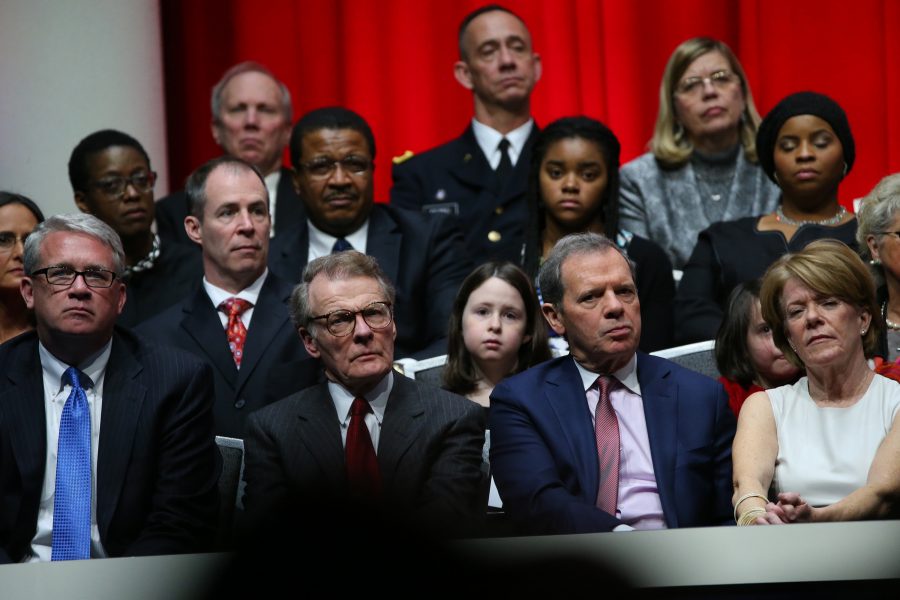EDITORIAL: Two million reasons to vote ‘yes’ on school funding bill
Speaker Mike Madigan and Senate President John Cullerton listen as Gov. Bruce Rauner speaks about making changes in the state on Monday Jan. 12, 2015 at the Prairie Capital Convention Center in Springfield, Ill. (Nancy Stone/Chicago Tribune/TNS)
August 27, 2017
If the stars align over the Illinois Capitol, lawmakers during the next few days will approve a sweeping education funding bill that’s at least a decade in the making.
The proposal would fund schools for the current fiscal year. It would pump additional money to schools through a new mathematical formula. It would create a program for low- and middle-income families to access privately-raised donations for tuition scholarships. Those key components present a trifecta of opportunity for the state’s 2 million public school children. In other words, 2 million reasons for lawmakers to vote “yes.”
Voting against the proposal would be a vote for the status quo: No additional money for schools. No relaxation of reliance on property taxes. No escape route for kids trapped in poorly-performing schools.
Advertisement
We’ve been here before. In 2010, House lawmakers killed a bill that would have established a pilot program to help 20,000 Chicago Public Schools students in chronically underperforming schools attend private schools. Sponsored by then-Sen. James Meeks, a Chicago Democrat and pastor who is now State Board of Education chairman, the legislation would have created a voucher program. Parents could access public tax dollars to spend on tuition at private schools. But 44 Democrats and 22 Republicans voted it down. Some of those lawmakers are still serving in Springfield.
Let’s be clear: The scholarship program being proposed now is not a voucher program. It does not take public tax money and give it to families for private school. Rather, it’s an incentive program that would raise up to $100 million annually from citizens and companies toward state-approved nonprofit scholarship organizations, which would divide up the donations into scholarships for qualifying families. In exchange, the donors would receive income tax credits. The latest version of the legislation would give them a 75-cent tax break for every $1 donated. Seventeen other states, including Indiana, offer similar programs.
Opposition to the school funding package is building from predictable quarters. Many Republicans don’t like money and resources in the legislation for Chicago Public Schools. Many Democrats don’t want public school kids being tempted to transfer to private schools. (The legislation also would allow scholarship families to switch from one public school to another public school).
Think about that. Some lawmakers, many of whom send their own kids to private schools, would rather trap the state’s poorest and least-advantaged kids in schools that chronically underperform. Schools that have failed to educate and graduate students for generations. Schools where lawmakers wouldn’t send their own children.
This proposal offers the chance to change that.
It also provides money for every school district to operate for the current fiscal year, which began July 1. Because there has not been agreement between the legislature and Gov. Bruce Rauner, all public schools are waiting for checks from this deadbeat state.
And the bill would revise a funding formula that for two decades has grown more ineffective. Illinois has some public schools that can afford to spend only $7,500 per child and other schools that spend $23,500 per child. This bill would start making a shift toward the middle. Wealthy districts will always be able to spend more. But low-income districts can try to catch up.
Advertisement*
House lawmakers are scheduled to be in Springfield Monday to consider the proposal. If the House passes it, the Senate would take it up next.
Expect opposing lawmakers to offer all kinds of excuses about what they don’t like in the proposal. Several already have, including Rep. Will Guzzardi, D-Chicago. How many struggling families in his Logan Square community would leap at the chance to switch schools? Probably many.
If the stars align, lawmakers will be focused on all the reasons to vote “yes.” There are, remember, 2 million of them.
___
(c)2017 the Chicago Tribune
Visit the Chicago Tribune at www.chicagotribune.com
Distributed by Tribune Content Agency, LLC.
Advertisement








